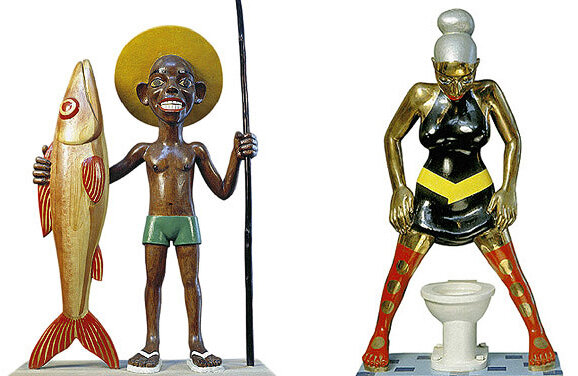Alexander Povzner
ART EXPERIMENT
Alexander Povzner works in peace and quiet studio lit by natural sunlight. Here he makes his installations that reflect and combine his two areas of expertise: traditional sculpture and conceptual art. As part of his Art Experiment, Povzner gets the viewers acquainted with his current work: transforming previous pieces, calling back childhood memories of his first encounters with different media.
REPORT ON THE WORK DONE
Povzner’s sculptures and installations seems to as some sort of industrial products, produced in a limited period and unleashed by the weight during work time. Thus it can be expected that Povzner himself sees his works as a commodities (historically, not practically) that exist on the crossroad of such definitions as ‘fetish’, ‘mean of symbolic exchange’, and ‘subject of no economic value’. Povzner factory produces those commodities that are as close to ‘positive fetishes’ as one could get, yet they do not lose their ‘genealogy’ that includes African sculpture and surrealistic objects.
As part of his Report on the Work Done project, Povzner introduces two new elements — text (letters) and painting. Here the text seldom serves as mains source for jokes or a title. It is abstract to the level of rhythmic pattern like the Russia Я letter on a cliff resembling a constant wonderer from the paintings by Caspar David Friedrich. These paintings that complement the sculptures derive images from photos made by Povzner, rather than reality itself.
Valentin Dyakonov
PLAYGROUND / 2012
The Way of Enthusiasts explores the artistic discourse and spatial commentaries between artists and works produced during, and subsequent to, a specific historical and cultural period in Soviet Russia, namely the collapse of the mass social housing projects in the 50’s.
Alexander Povzner Playground project is a reconstruction of a little public space, designed for play or physical exercise. The space gathers together different objects that could be used by anyone. This kind of playground was a common thing in every soviet courtyard, surrounded by typical dwelling blocks. The Playground in the exhibition is filled with strange objects that only remind the real constructions of a playground. All of them – an installation with rings, parallel bars, staircases, seesaw, benches - are made from pieces of iron fittings, coarse chains, car tires. These objects testify to the industrial nature of the city and at the same time they turn out to lack functionality.
Povzner is known for working in the ready-made tradition. He deforms the context of use of the objects and place them in the unusual situation. At the same time he slightly distorts the ready-made nature of things he works with and rather uses the urban space as a ‘ready made’.
PRESENT PERFECT / 2009
Alexander Povzner re ects upon the nature and functions of traditional figurative qualities of sculpture in a modern world. The artist estranges himself from production by using the results of someone else’s work. Turning towards the isolated universe of apprentices’ guild-ship, he acquires students’ sculptures that represent classical standards of antique sculpture. He chooses to use ‘ready mades’. Starting from Duchamp, the main goal of ‘ready mades’ was to deform customary context of culture artifacts.
Placing those ‘ready mades’ covered with green paint in flowerpots, the artist ironically underlines decorative aspects of antique sculpture. Such an approach is a sort of overthrowing utopian culture values. Antique sculptures become the kind houseplants, placed somewhere on the windowsills. Only this way can they exist in a modern-day culture.
Maria Chekhonadskikh
SLIPPERY CONDITIONS, 2014
BRONZE AND WOODEN SCULPTURES
GONE SHOPPIN' BE BACK IN 5 MIN, 2013



















